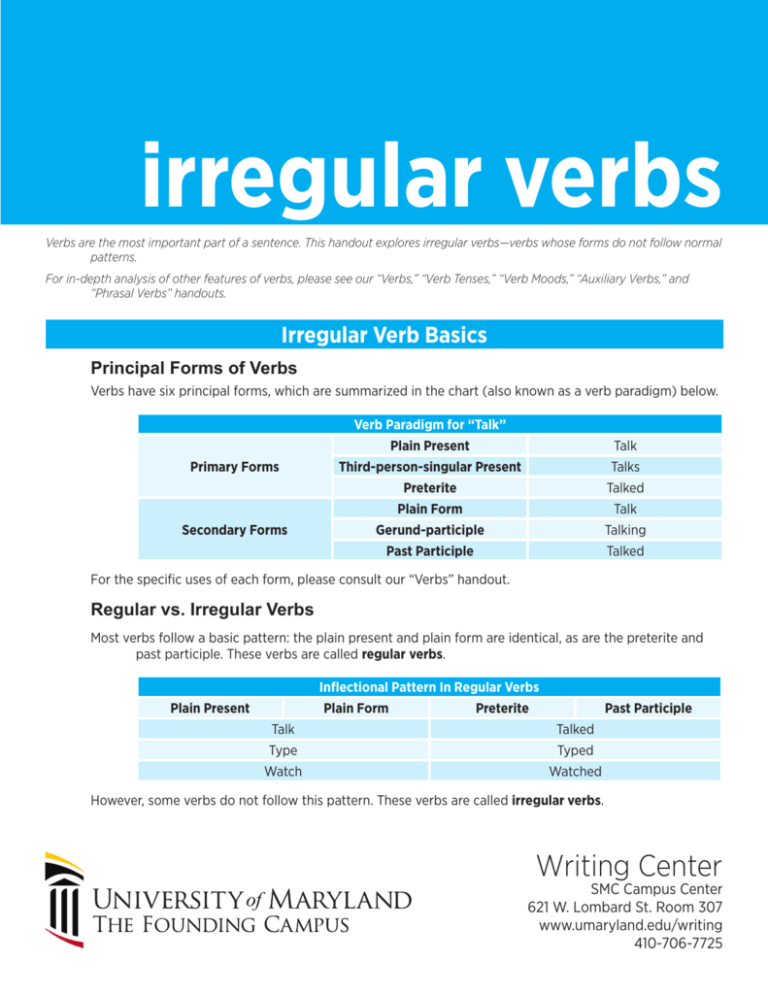
irregular verbs
Verbs are the most important part of a sentence. This handout explores irregular verbs—verbs whose forms do not follow normal
patterns.
For in-depth analysis of other features of verbs, please see our “Verbs,” “Verb Tenses,” “Verb Moods,” “Auxiliary Verbs,” and
“Phrasal Verbs” handouts.
Irregular Verb Basics
Principal Forms of Verbs
Verbs have six principal forms, which are summarized in the chart (also known as a verb paradigm) below.
Verb Paradigm for “Talk”
Primary Forms
Secondary Forms
Plain Present
Talk
Third-person-singular Present
Talks
Preterite
Talked
Plain Form
Talk
Gerund-participle
Talking
Past Participle
Talked
For the specific uses of each form, please consult our “Verbs” handout.
Regular vs. Irregular Verbs
Most verbs follow a basic pattern: the plain present and plain form are identical, as are the preterite and
past participle. These verbs are called regular verbs.
Inflectional Pattern In Regular Verbs
Plain Present
Plain Form
Preterite
Past Participle
Talk
Talked
Type
Typed
Watch
Watched
However, some verbs do not follow this pattern. These verbs are called irregular verbs.
Writing Center
SMC Campus Center
621 W. Lombard St. Room 307
www.umaryland.edu/writing
410-706-7725
“Be”
Since “be” is the most irregular verb in English, we have included it here as well as in our “Verbs” handout.
Verb Paradigm for “Be”
Present
Singular
Plural
First Person
Am
Are
Second Person
Are
Are
Third Person
Is
Are
Singular
Plural
First Person
Was
Were
Second Person
Were
Were
Third Person
Was
Were
Primary Forms
Preterite
Plain Form
Be
Gerundparticiple
Being
Past Participle
Been
Secondary Forms
Common Irregular Verbs
Below we have included a list of the most common irregular verbs. You can use this list to form a variety of
sentences.
Simple Present: We see him everyday.
3rd-Person Singular Present: She sees him on Wednesdays.
Preterite: I saw him yesterday.
Plain Form: Would you like to see him?
Gerund-participle: They won’t be seeing him.
Past Participle: No on has seen him.
Irregular Verbs
Primary Forms
Secondary Forms
Verb
Simple
Present
3rd-person
Singular
Present
Preterite
Plain Form
GerundParticiple
Past
Participle
Become
Become
Becomes
Became
Become
Becoming
Become
Begin
Begin
Begins
Began
Begin
Beginning
Begun
Bring
Bring
Brings
Brought
Bring
Bringing
Brought
Come
Come
Comes
Came
Come
Coming
Come
Writing Center
SMC Campus Center
621 W. Lombard St. Room 307
www.umaryland.edu/writing
410-706-7725
Irregular Verbs
Primary Forms
Secondary Forms
Verb
Simple
Present
3rd-person
Singular
Present
Preterite
Plain Form
GerundParticiple
Past
Participle
Feel
Feel
Feels
Felt
Feel
Feeling
Felt
Find
Find
Finds
Found
Find
Finding
Found
Get
Get
Gets
Got
Get
Getting
Got/Gotten
Give
Give
Gives
Gave
Give
Giving
Given
Go
Go
Goes
Went
Go
Going
Gone
Have
Have
Haves
Had
Have
Having
Had
Keep
Keep
Keeps
Kept
Keep
Keeping
Kept
Know
Know
Knows
Knew
Know
Knowing
Known
Leave
Leave
Leaves
Left
Leave
Leaving
Left
Make
Make
Makes
Made
Make
Making
Made
Put
Put
Puts
Put
Put
Putting
Put
Say
Say
Says
Said
Say
Saying
Said
See
See
Sees
Saw
See
Seeing
Seen
Show
Show
Shows
Showed
Show
Showing
Shown
Take
Take
Takes
Took
Take
Taking
Taken
Tell
Tell
Tells
Told
Tell
Telling
Told
Think
Think
Thinks
Thought
Think
Thinking
Thought
References
Azar, B. S., & Hagen, S. A. (2009). Understanding and using English grammar. White Plains, NY: Pearson Longman.
Hewings, M. (2013). Advanced grammar in use. Cambridge, UK: Cambridge University Press.
Huddleston, R., & Pullum, G.K. (2002). The Cambridge grammar of the English language. Cambridge, UK: Cambridge University
Press.
Huddleston, R., & Pullum, G.K. (2005). A student’s introduction to English grammar. Cambridge, UK: Cambridge University
Press.
Murphy, M. (2012). English grammar in use. Cambridge, UK: Cambridge University Press.
Writing Center
SMC Campus Center
621 W. Lombard St. Room 307
www.umaryland.edu/writing
410-706-7725







